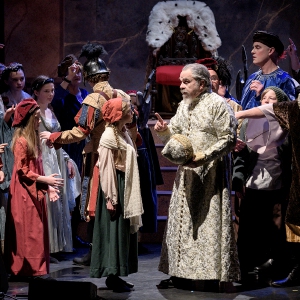Art Notes: Bertolt Brecht plays reflect how law and justice can be twisted
| Published: 05-10-2023 4:59 PM |
During her upbringing in the Netherlands, Ria Blaas didn’t have Bertolt Brecht on her reading list.
Come to think of it, who does? Even among theater aficionados, Brecht seldom rises to the top of the list when a season series is assembled.
“He’s not easy to perform,” Blaas, a Norwich resident, said in a phone interview. Nevertheless, Blaas is directing a production of two short Brecht plays at Parish Players in Thetford Hill, running Thursday through Sunday.
Three of Brecht’s works — “The Threepenny Opera,” “Mother Courage and her Children” and “The Caucasian Chalk Circle” — are part of the theatrical canon, but even they aren’t frequently performed. A search of the Valley News archives shows the last reference to a local production of “Threepenny Opera” is from a performance in Woodstock in 1986, for example.
Stagings of Brecht’s lesser-known plays are even rarer. Blaas stumbled on them when she picked up a book on a friend’s discard pile 18 months ago. What the early-20th-century German playwright had to say about the law and how it can be distorted seems sadly relevant at the moment.
One of the plays that caught Blaas’ attention was “The Elephant Calf,” which was first a play within a play, part of “Man Equals Man,” one of Brecht’s early works.
In “Calf,” the characters of “Man Equals Man” put on a play in which the baby elephant of the title is put on trial, charged with killing its mother. The episode is a kind of judicial farce, in keeping with the play’s subtitle: “The provability of any and every contention.”
When language is deployed without scruple, “the law in general doesn’t mean much anymore,” Blaas said.
Article continues after...
Yesterday's Most Read Articles
 Football helmet maker buys Lebanon’s Simbex
Football helmet maker buys Lebanon’s Simbex
 James Parker granted parole for his role in Dartmouth professors’ stabbing deaths
James Parker granted parole for his role in Dartmouth professors’ stabbing deaths
 Zantop daughter: ‘I wish James' family the best and hope that they are able to heal’
Zantop daughter: ‘I wish James' family the best and hope that they are able to heal’
 Kenyon: Dartmouth alumni join union-busting effort
Kenyon: Dartmouth alumni join union-busting effort
 Parker up for parole more than 2 decades after Dartmouth professor stabbing deaths
Parker up for parole more than 2 decades after Dartmouth professor stabbing deaths
 Through new school partnerships, CRREL seeks to educate young scientists
Through new school partnerships, CRREL seeks to educate young scientists
The play runs about 45 minutes, so to fill out the evening, Blaas went on a quest to find another short Brecht play. Eventually, she landed on “The Trial of Lucullus,” which first appeared as a radio play in 1940, closer to the end of Brecht’s career, and was later produced as an opera.
In “Trial,” the celebrated Roman general of the title dies and then appears before a judge and jury in the underworld to learn whether he would descend to Hades or be borne aloft to the Elysian Fields. He must submit to questioning from the jurors, who represent the ranks of ordinary people who would have suffered the most under his leadership.
In researching Brecht, I was interested to see how his work was treated. When he was in the U.S., during and immediately after World War II, he was investigated by the House Un-American Activities Committee for his communist sympathies. Later, he moved to East Berlin, where the authorities clamped down on his work, including “The Trial of Lucullus.”
The response to Brecht says more about power than it does about political systems.
Blaas is staging part of “Trial” as a shadow play, with actors and cutout figures behind a scrim. It’s a major challenge for the performers, she said.
“You have to express yourself between your body and your movements,” she said. “Actors, I’m sure they think about it, but not as much as you have to when you move a puppet,” she added. “Otherwise, it’s dead.”
Working on the plays has brought the cast of veteran actors together, Blaas said. Puppetry requires teamwork.
Something else that requires teamwork is living under a shared set of laws, and as a result a shared reality. Those things are in danger, Blaas said.
“We’re all sort of in limbo,” she said, “not only politically, but with global warming” and other issues.
“A law is something that we create,” Blaas said, noting that law trails behind reality. “Life goes on and some laws don’t work anymore, because things change.”
One more thing worth noting is that Blaas is known primarily as a visual artist. She sculpts, mainly in wood, and also paints and makes wooden bowls.
But every once in a while, she pops up with a performance like this one. It makes her one of the more versatile, and least predictable artists at work in the Upper Valley.
“What I like is every painting, every sculpture has a rhythm and a form, and when it’s done, things fall into place,” she said. “It’s the same with a play.” The actors work together, and eventually the play becomes theirs and follows their lead.
And then it’s over, and she can go back to work on something else.
“The Elephant Calf” and “The Trial of Lucullus,” by Bertolt Brecht, are in performance in Parish Players’ Eclipse Grange Theatre on Thetford Hill May 11-14. For tickets and more information, go to parishplayers.org.
Last week, JAG Productions was forced to cancel its scheduled performances of “Every Brilliant Thing,” a one-person show starring the company’s founder, Jarvis Antonio Green. The reason was all too familiar: Green had come down with COVID-19.
The company posted word on its website that the May 10 performance also was canceled. But Wednesday morning, he tested negative, so Thursday’s show has a green light. The production runs through Sunday, and tickets are 15% off for the final week’s shows. Pay attention to the company’s website, jagproductionsvt.com, social media and email for details.
Alex Hanson can be reached at ahanson@vnews.com or 603-727-3207.

 Art Notes: After losing primary venues, JAG Productions persists
Art Notes: After losing primary venues, JAG Productions persists  Over Easy: Marvels in the heavens, and in the yard
Over Easy: Marvels in the heavens, and in the yard  Amid financial difficulties, Lebanon-based Revels North cancels midwinter show
Amid financial difficulties, Lebanon-based Revels North cancels midwinter show  Art Notes: The Pilgrims to perform ‘last’ show Saturday in Hanover
Art Notes: The Pilgrims to perform ‘last’ show Saturday in Hanover
